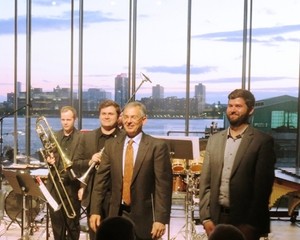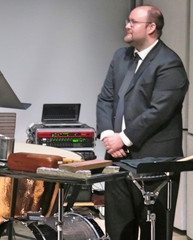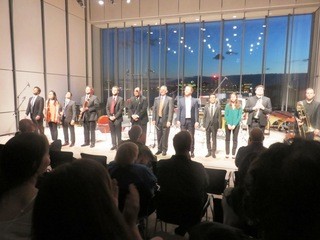|
Back
When Language Is Alien New York
Susan and John Hess Family Theater, Whitney Museum of American Art
06/08/2016 -
Thomas Kotcheff: bang Z
Stephen Hartke: The Blue Studio
Nina C. Young: Rising Tide
Steven Stucky: The Stars and the Roses
Christopher Stark: Mercy Bell
Esa-Pekka Salonen: Catch and Release
Spencer Lang (Tenor)
Aspen Music Festival and School’s Aspen Contemporary Music Ensemble, Timothy Weiss (Conductor)

J. Smith, B. Olson, T. Weiss, C. Stark (© Samuel A. Dog)
Several times in the reviews coming form the NY Phil Biennial concerts, I’ve used the word “language”, and this is regretful. Language, despite Wittgenstein, can be scientifically established: one says one thing (“Hat”, “Hippo”, “Bassoon”), quite assured that the person to whom one is speaking will picture the three objects in question.
Music, as I realized last night, has no language at all. Syntax, grammar, sounds, of course. Titles, too (“The Blue Studio”, “Rising Tide”) probably give some indication of meanings. But once this music begins to play, whether it be the classical piano/violin/cello trio of Blue Studio or a complete chamber orchestra as in Esa-Pekka Salnonen’s Catch and Release, we are all privy to our own thoughts–or mental meanderings.
The listener’s meanderings are, from the composer’s point of view, iniquitous. Here was noted composer Stephen Hartke, who had obviously worked hard on his Blue Studio. Even describing it as a kind of Pictures at an Exhibition, (“A visitor leafing through the movements as if a portfolio of drawings”), with the Mussorgsky-like Promenade before each drawing. His music was adept, his technique faultless, one could sometimes be drawn to different feelings with the tempo and color. But the pictures were never pictorial, nor were the musical graphics terribly endearing. It was a heartfelt work produced with great seriousness, but basically, empty.
Not so with two works of more original pictorialism. Christopher Stark’s Mercy Bell took as a basis one of Giotto’s bells in the Campanile smack in the middle of Florence. Yes, percussionist Zachary Robason echoed with bells several times. But in this case, Mr. Stark gave us the literal pictures plus a nuance of bells. Instead of “Hat”-“Hippo” literalism, he had given us a resonance of bells, straight, with Stravinsky-like jolting, with a jazzy interlude, and a nuance of bells. Where we could feel the bells without actually hearing them.
Thus it had the abstraction–and power–of poetry.

Z. Robason (© Samuel A. Dog)
I found that same non-pictorial imagery in the opening bang Z, a pun-title on the bangxi wood block. The latter is used mainly in Chinese opera to accentuate, the punctuate movements from the characters. Composer Thomas Kotcheff, though, used the wooden blocks and tin cans–played with great excitement by Mr. Robason–as sounds themselves. In fact, the primary sounds, intercepted only by the more doleful, more conservative chamber orchestral tones.
The contrast was delicious. Because now we had a real language–those cracking, syllabic, running-jumping sounds–played in consonance and dissonance with pianist Ryan Shirar and a concertante bass clarinet, violin and cello. In this case, I happened to feel like a domestic animal, intensely awareness of the language, without either knowing (or caring to know) what the sounds meant.
Rising Tide by Nina C. Young had the challenge of being about climate change (melting ice caps, rising sea levels) and Julius Caesar’s well-known, “There is a tide in the affairs of men” with additional meteorological images. Ms. Young coincidentally was vying with another melting-ice piece, ice, by Dai Fujikura.
Both composers used the sounds of the orchestra to metaphorically imitate ice melting. Both composers used orchestral affects by Edgard Varèse to make their points. Ms Young’s work was, craftily produced...
Yet somewhat dainty. The silent images of a Greenland ice outcrop ending its seemingly eternal position and crashing into the sea have more tragedy than a chamber orchestra or a Shakespearean reference.

Aspen Ensemble at Whitney (© Samuel A. Dog)
To their credit these musicians from the Aspen Contemporary Ensemble, especially conductor Timothy Weiss, did wonders with all their music, especially for the two most famed composers here.
Esa-Pekka Salonen was not on hand, but his Catch and Release, as usual, was original, inventive and playful. The first movement Tema especially not only had the orchestration of Stravinsky’s Soldier’s Tale, but that same parodistic, energetic driving rhythm. Alas, the following two movements, Aria and Games, left me a bit cold. Obviously, Mr. Salonen was attempting, especially in the last movement, to set the rules and let us plow through the delightful sounds, but at first hearing, I couldn’t do it.
Which bring me to the most wondrous work, and the most tragic. Steven Stucky, who was set to lead the Aspen group before his death four months ago, was a composer who was always original, communicative and, most of all, feeling.
With his The Stars and the Roses, he used real language–three poems by Czeslaw Milosz. Yet, even with the most evocative singing by tenor Spencer Laing, that language was subordinate to the most magnificent orchestral writing. Yes, I wished that I had read the three poems before listening to this. Not for the language, but simply as a basis, a crutch if you will, for the floating, soaring, deeply cosmic sounds which Mr. Stucky had created.
For Mr. Stucky understood here that neither poetry not music is language per se. Both arts veer sharply from our literal understanding. He also understood that the merger of the two produce an effect which can move us emotionally in ways which are impossible to describe.
And that is why a creation like The Stars and the Roses needs to be heard at least once more. The feelings he created were, unlike so much of the former music, echoing the final words of a Milosz poem, “bright, beautiful, warm and free.”
Harry Rolnick
|